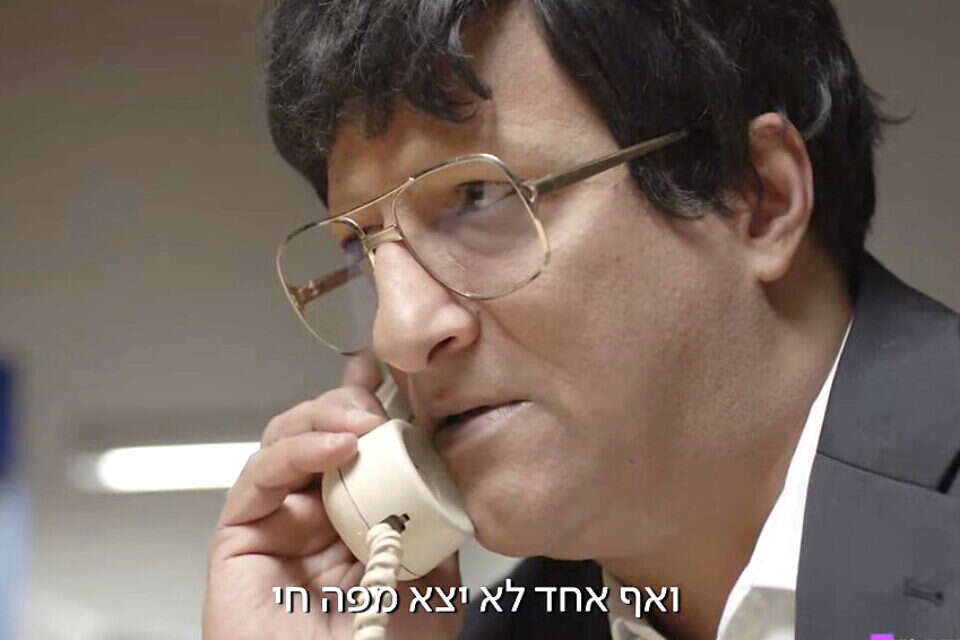A frame of whitish toy dolls for babies in a basket and above them a sign that reads "This is how Yemeni babies were traded," which stated the explicit sum of $ 5,000 per baby, is the first moving frame from "Meshulam Riddle" - a three-episode docu-drama that accompanies Rabbi Uzi Meshulam in his struggle to break The bond of silence and silence surrounding the affair of the abducted Yemeni children, an earthquake that threatened to put the heads of state in prison.
The debate over Rabbi Uzi Meshulam has always revolved around the question of whether he is a fighter for justice or a violent and controversial figure, and the docu-drama that came up last night (Tuesday) here 11 asks "why not both?"
1994. Rabbi Uzi Meshulam locks himself in his home in Yehud together with a group of Hasidim, who in my opinion at least managed to see through the smoke screens scattered by the establishment of the most serious social affair in the history of Israel.
Were babies taken from tents by Yemeni immigrants and sold?
It seems so.
28 years after Meshulam's fortification, the protocols of the affair are still buried for decades to come, and if there is still smoke, then there was probably fire as well.
Today, the original police recordings of the pre-clash negotiations with Meshulam himself and his followers on the day of the break-in are revealed.
These reveal the relationship between the fearless payer and the wordless police officers who conducted the incident.
Rabbi Uzi Meshulam was a strange and eccentric figure, larger than life, a man with excessive confidence, dangerous and dangerous verbal violence - and his character is portrayed by an actor who is remarkably similar to him.
However, the limitations of the genre are revealed when he is forced to emulate him and often sounds like Assi Cohen from "The Levels" in "A Wonderful Land."
But do not worry, the creator of the series did not let the shortcomings of the genre take over the document and take it in the directions of the filmed and artificial theater, even if the actual reconstruction of what is done inside the house does not rise dramatically and does not matter.
Compensates for him a determined striving to bring the truth around the whole affair.
Accurate editing care makes it possible to switch from the external broadcasts on television to the interior of the house, whose people are embodied by the actors.
The true character of Meshulam is revealed in archive footage and interviews, in which a complex persona is revealed that was useful and related to the Yemeni children's affair at the same time.
When the motto was "kill and be killed" - it's hard not to treat him as a disturbed cult leader.
It is fascinating to see how he was treated then on Channel One broadcasts, and the line along the docu is led by Haim Yavin.
The Israeli media of the time fully cooperated with the establishment and was funded by it.
The really fascinating media story happened in the field - where the young police reporter Ayala Hasson stayed throughout the days of the siege.
Hasson is one of the heroines of the document, both because of her willingness to sit in front of the cameras today and tell the story, and also because of her special relationship with the leader of the uprising.
More than once she looked at Meshulam with the whites of her eyes and the weapons pointed at her and was the target of insults and insults thrown at her from Meshulam's own mouth every time he went out to the cameras.
She is also the only one who was privileged to enter the house in Yehud.
The human environment around Meshulam is fascinating and tells about those days in detail, and it includes first-hand evidence of Ashkenazi and Mizrahi loyalists, secular and religious, military and media personnel who did not buy the state's position.
The third chapter is the most moving and brings the testimonies of the kibbutz nurses, who tell of a pattern of taking healthy babies and transferring them to the United States.
Were we wrong?
Fixed!
If you found an error in the article, we'll be happy for you to share it with us

